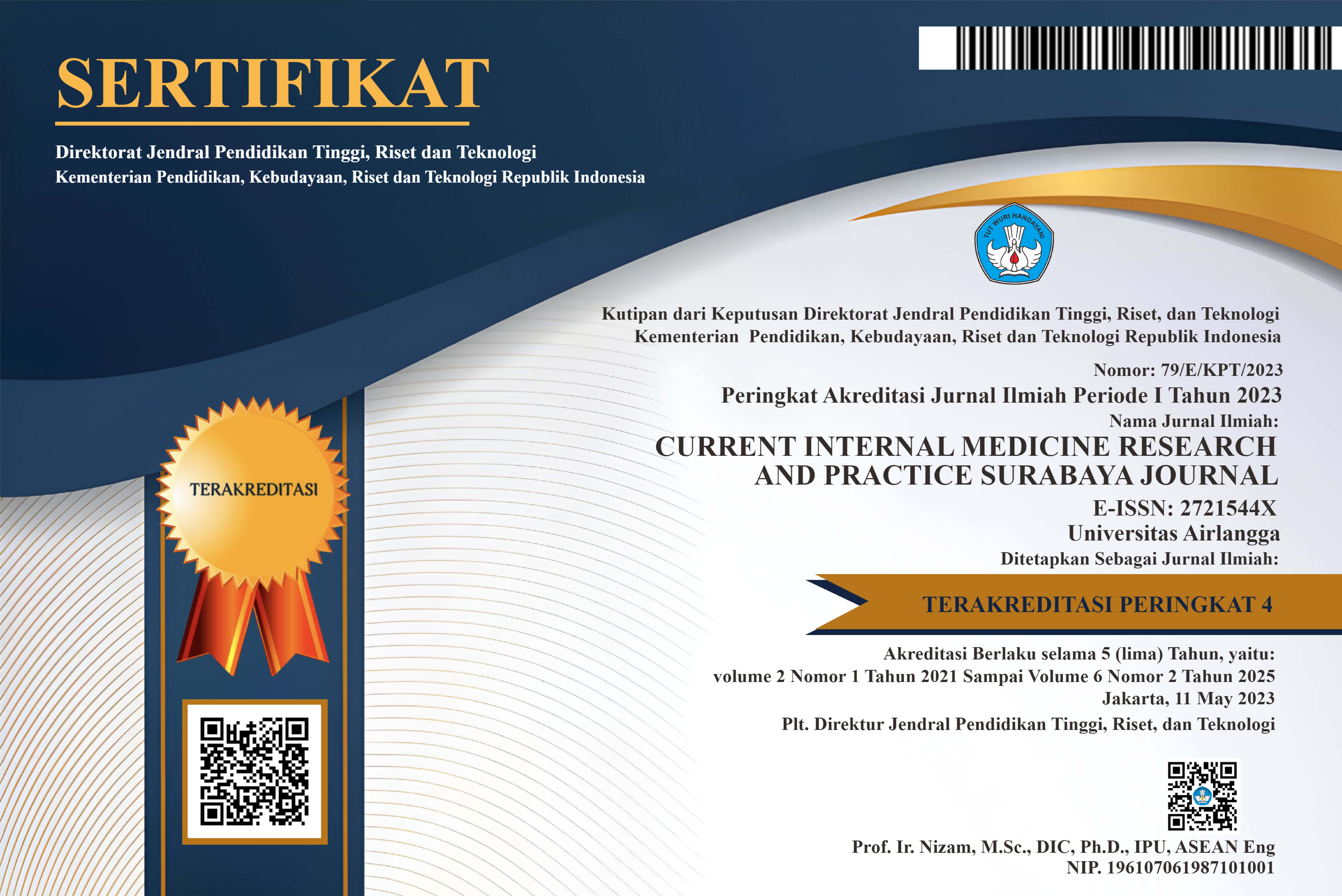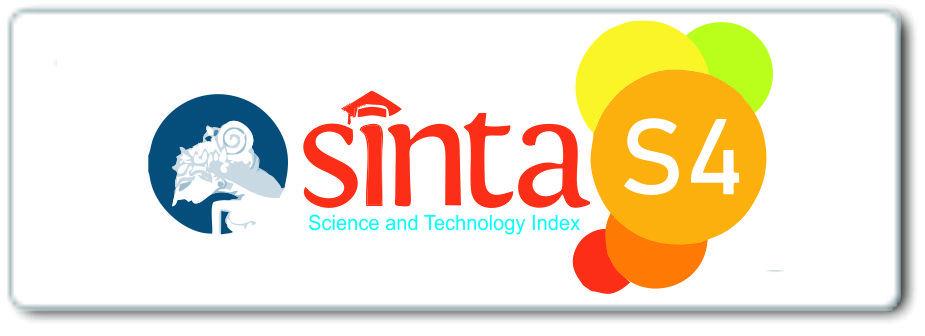DIAGNOSTIC AND MANAGEMENT PROBLEMS OF HYPERTHYROIDISM IN A PATIENT WITH TESTICULAR SEMINOMA
Downloads
Palace MR. 2017. Perioperative Management of Thyroid Dysfunction. Health Services Insight: 1-5.
Sutjahjo A, Tjokroprawiro A. 2015. Tirotoksikosis. In: Tjokroprawiro A, Setiawan PB, Effendi C, Santoso D, Soegiarto G (eds.): Buku Ajar Ilmu Penyakit Dalam Fakultas Kedokteran Universitas Airlangga, Rumah Sakit Pendidikan Dr. Soetomo Surabaya, Edisi 2. Airlangga University Press; 136-39.
Baagar K, Khan FY, Al-Kuwari E. 2013. Choriocarcinoma Syndrome: A Case Report and a Literature View. Case Rep Oncol Med: 1-4.
Hussain H, Eck LM. 2012. hCG Induced Hyperthyroidism Due to a Metastatic Germ Cell Tumor. Kansas J of Med: 58-61.
Pelosof LC, Gerber DE. 2010. Paraneoplastic Syndromes: An Approach to Diagnosis and Treatment. Mayo Clin Proc; 85(9): 838-54.
Dimitriadis GK, Angelousi A, Weickert MO, Randeva HS, Kaltsas G, Grossman A. 2017. Paraneoplastic Endocrine Syndromes. Society Endocrinol: 1-51.
Bose S, Sengupta S, Mukherjee R. 2017. Case Report: Seminoma in an Undescended Testis. SM J Surg; 3(2): 1018-19.
Carlotto JRM, Colleoni-Neto R, Shigueoka DC, Artigiani-Neto R, Lopes-Filho GJ. 2015. Intraabdominal Seminoma Testis in Adult: Case Report. Arq Bras Cir Dig; 2015: 28(4): 296.
Taslimi R. 2011. Forgotten Abdominal Pain. Middle East J Digest Dis; 3(1): 72-73.
Kurdi MS. 2014. Trophoblastic Hyperthyroidism and Its Perioperative Concerns. Thyroid Disorders: 243-
Meister LHF, Hauck PR, Graf H, Carvalho GA. 2005. Hyperthyroidism Due to Secretion of Human Chorionic Gonadotropin in a Patient with Metastatic Choriocarcinoma. Arq Bras Endocrinol Metab; 49(2): 319-22.
Sotello D, Rivas AM, Test VJ, Lado-Abeal J. 2016. Choriocarcinoma Presenting with Thyrotoxicosis. Bayl Univ Med Cent; 29(1): 42-43.
Mieritz MG, Sorensen K, Aksglaede L, Mouritsen A, Hagen CP, Hilsted L, Andersson AM, Juul A. Elevated Serum Levels of Free Triiodothyronine in Adolescent Boys with Gynaecomastia Compared with Controls. Eur J Endocrin 2014; 171: 193-98.
Ross DS, Burch HB, Cooper DS, Greenlee MC, Laurberg P, Maia AL, Rivkees SA, Samuels M, Sosa JA, Stan MN, Walter MA. 2016. 2016 American Thyroid Association Guidelines for Diagnosis and Management of Hyperthyroidism and Other Causes of Thyrotoxicosis. Thyroid; 26(10): 1343-1421.
Mittra ES, Niederkohr RD, Rodriguez C, El-Maghraby T, McDougall. 2008. Uncommon Causes of Thyrotoxicosis. J Nucl Med; 49: 265-78.
Tan JG, Aw TC. 2018. Assessment of Thyroid Function. J Endocr Disord; 5(1): 1030.
Oldenburg J, Fossa SD, Nuver J, Heidenreich A, Schmoll HJ, Bokemeyer C, Horwich A, Beyer J, Kataja V. 2013. Testicular Seminoma and Non-Seminoma: ESMO Clinical Practice Guidelines for Diagnosis, Treatment, and Follow-up. Annals of Oncol; 24(Supp 6): vi125-vi132.
Handayani W. 2015. Laki-laki 18 Tahun dengan Tumor Testis. Fakultas Kedokteran Universitas Lampung.
Gama R. 2001. Hyperthyroidism Induced by Beta-Human Chorionic Gonadotropin. Postgrad Med J; 77:423-24.
Walkington L, Webster J, Hancock BW, Everard J, Coleman RE. 2011. Hyperthyroidism and Human Chorionic Gonadotrophin Production in Gestational Trophoblastic Disease. British J Cancer; 104: 1665-69.
Copyright (c) 2022 Dicky Febrianto, Hermina Novida

This work is licensed under a Creative Commons Attribution-ShareAlike 4.0 International License.
Copyright (c) Author
1. The journal allows the author to hold the copyright of the article without restrictions.
2. The journal allows the author(s) to retain publishing rights without restrictions.
3. The formal legal aspect of journal publication accessibility refers to Creative Commons Atribution-Share Alike 4.0 (CC BY-SA).






















